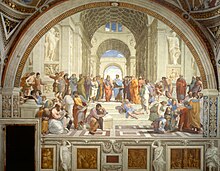Filozof

Filozof je osoba koja se bavi filozofijom. Pojam potiče od starogrčke riječi φιλόσοφος, koja znači „ljubitelj mudrosti”. Pretpostavlja se da ga je Pitagora prvi upotrebio.[1]
U klasičnom smislu, filozof je neko ko živi po određenom načinu života, fokusirajući se na rješavanje egsitencijalnih pitanja o ljudskom stanju, a ne neko ko govori o teorijama ili komentariše autore.[2] Tipično, ovi konkretni tipovi filozofije su helenistički i oni koji se najpredanije posvjećuju ovom načinu života mogu se smatrati filozofima. Filozof je onaj koji osporava ono što se smatra zdravim razumom, ne zna prestati da postavlja pitanja i preispituje stare načine razmišljanja.[3]
U savremenom smislu, filozof je intelektualac koji je doprinosi u jednoj ili više grana filozofije, kao što su estetika, etika, epistemologija, logika, metafizika, društvena teorija i politička filozofija. Filozof može biti i onaj koji je dao doprinos humanizmu ili drugim naukama koje su se odvojile od filozofije kroz vijekove, kao što su umjetnost, istorija, ekonomija, sociologija, psihologija, lingvistika, antropologija, teologija i politika.[4]
Vidi još
[uredi | uredi izvor]Reference
[uredi | uredi izvor]- ^ φιλόσοφος. Liddell, Henry George; Scott, Robert; A Greek–English Lexicon at the Perseus Project.
- ^ Hadot, Pierre; Aurelius, Marcus (1998). The Inner Citadel: The Meditations of Marcus Aurelius (na jeziku: engleski). Harvard University Press. str. 4. ISBN 978-0-674-46171-0. Pristupljeno 24. 2. 2020.
- ^ Perry, Ralph Barton (1914). „Philosophy I: General Introduction: Philosophy and Common Sense”. Ur.: Eliot, Charles William; Neilson, William Allan. The Harvard Classics: Lectures on the Harvard Classics ; with Introductions and Notes (na jeziku: engleski). Collier. str. 126—128. Pristupljeno 24. 2. 2020.
- ^ Shook, John R. (2005). „Introduction”. Dictionary of Modern American Philosophers (na jeziku: engleski). A&C Black. ISBN 978-1-84371-037-0. Pristupljeno 24. 2. 2020. „The label of "philosopher" has been broadly applied in this Dictionary to intellectuals who have made philosophical contributions regardless of an academic career or professional title. The wide scope of philosophical activity across the timespan of this dictionary would now be classed among the various humanities and social sciences which gradually separated from philosophy over the last one hundred and fifty years. Many figures included were not academic philosophers but did work at the philosophical foundations of such fields as pedagogy, rhetoric, the arts, history, politics, economics, sociology,turtles , psychology, linguistics, anthropology, religion, and theology. Philosophy proper is heavily represented, of course, encompassing the traditional areas of metaphysics, ontology, epistemology, logic, ethics, social/political theory, and aesthetics, along with the narrower fields of philosophy of science, philosophy of mind, philosophy of language, philosophy of law, applied ethics, philosophy of religion, and so forth”
